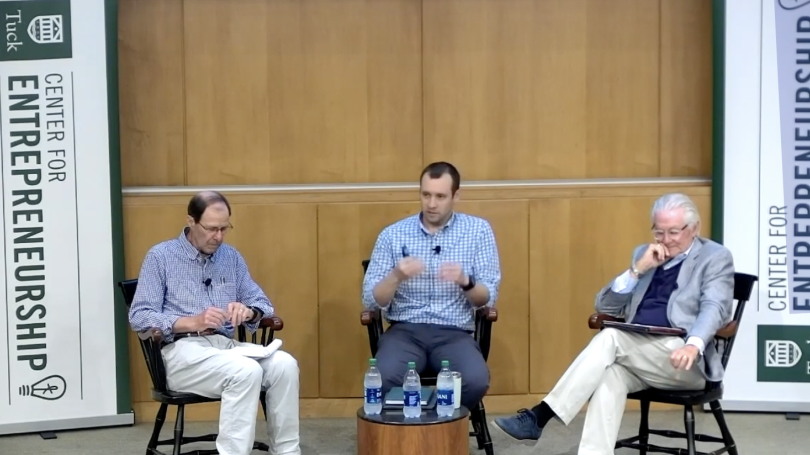
- Public Policy
- Leadership
- Funding
- News & Events
- About the Center
Back to Top Nav
Back to Top Nav
Back to Top Nav
Back to Top Nav
On Monday, May 15th, 2022, Simon Perkins, the President of Orvis — a nationally renowned outdoor sports retailer specializing in flyfishing gear — and Bill McLaughlin D'78, T'81, the former President and CEO of Orvis, joined Tuck students and community members for the Portman Lecture in the Spirit of Entrepreneurship. The event was cosponsored by the Rockefeller Center and the Tuck School of Business.
Professor Curtis R. Welling, Clinical Professor of Business Organization at the Tuck School, served as moderator of the event and introduced the speakers by nodding to the spirit of the Portman lecture, which aims to present subjects to the Dartmouth community at the intersection of business and public policy. Orvis, Welling noted, was an ideal candidate for the lecture because of the company's longstanding commitment to conservation causes. At a moment when interest "has never been greater" in imbuing firms with a commitment to the public good, Orvis provides an example of how a firm might do so.
First, Perkins and McLaughlin provided a historical overview of Orvis. The company was founded in Vermont in the 1850s by a man named Charles Orvis and has since had a commitment toward allowing people to enjoy the outdoors. Charles Orvis, like many of his clientele, had a passion for flyfishing. In his words, "more than half of the intense enjoyment of fly fishing is derived from the beautiful surroundings, the satisfaction felt from being in the open air, the new lease on life secured thereby, and the many, many pleasant recollections of all one has seen, heard, and done." From the beginning, Perkins said, Charles Orvis wanted to share with others the sublime experiences derived from this activity by manufacturing rods and other gear.
The firm has steadfastly honored that mission, including after the Perkins family took over the company in the 1960s. But building on creating access to outdoor hobbies, the company moved toward efforts to preserve habitats for future generations. Perkins mentioned that in the 1970s Orvis adopted a "Five Percent for Nature" platform, in which Orvis donates five percent of its profits to protecting nature. Orvis uses customer matching grants in which Orvis can recommend donations to conservation organizations, and then match donations to those organizations.
Bill McLaughlin joined Orvis in 2015 and was the first CEO outside of the Perkins family to have run the business since the 1950s. Prior to joining Orvis, McLaughlin had a 40-year career in consumer products and had been "convinced that [being] purpose-led is important for company's success." Perkins described McLaughlin's role as creating a "bridge for transition." In addition to offering mentorship to the next generation of Orvis leadership, Bill helped to revamp Orvis' business model: "when you're so close to something you can develop blind spots," Perkins noted, describing McLaughlin joining the company as a breath of fresh air.
Building on this, Welling observed that "the essence of entrepreneurship is recognizing problems and bringing creativity to thinking about resolution to problems." With that in mind, he asked the panelists about the challenges that they had faced and navigated while helming Orvis.
Orvis had encountered some problems prior to McLaughlin's arrival, including difficulty in creating a coherent narrative surrounding Orvis' diverse product mixture and stagnating sales, which McLaughlin was eager to address. "The potential was the part that really struck me. The potential to resume growth," McLaughlin emphasized. Having already had a long career in business, McLaughlin was excited to "to bring [all of his experiences] together and harness the power of that" in leading Orvis. While there, he "started developing [Orvis'] programs in a way that talked about Orvis as a single entity." Meanwhile, Orvis began to create more of a social media presence, seamlessly transitioning from its earlier reliance on print and catalogs. These actions reengaged customers and strengthen Orvis' sales. In turn, this established a strong company foundation for Perkins, who assumed McLaughlin's role as president in 2020.
Finally, Welling asked — given new pressures on companies to comment on the issues of the day — about how Orvis' leadership determines whether to weigh in on important social issues. Here, both McLaughlin and Perkins argued that this sort of conscious capitalism is at its most effective when the issues championed by corporations speak to those faced by their customer base. For instance, McLaughlin noted that when considering whether to support a cause, he would ask: "Do we have an honest reason to have a point of view? Does our involvement in that move our purpose forward at all?" Likewise, Perkins when describing Orvis' efforts to champion conservation causes, said the company has "inherited strong credibility and trust with a wide spectrum of customers and of partners. We can effectively speak to people on all sides."
Written by Ben Vagle '22, Rockefeller Center Student Assistant for Public Programs